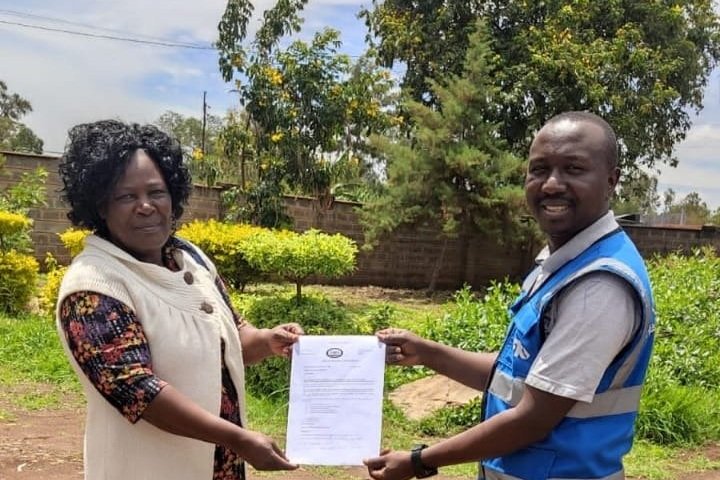Prioritizing Healthcare Access in Informal Settlements: Celebrating Community Health Volunteers on World Health Day
By Jacob Omondi, Sarah Ouma and Jane Wairutu
CHV being awarded with a new engagement letter by the County Government of Nairobi on World Health Day 2023
As the world celebrates World Health Day today, access to healthcare remains a major challenge for people living in informal settlements. It's high time we prioritize access to healthcare in informal settlements, especially in areas like Mathare. Some of the issues that need attention include the number of healthcare facilities, the quality of service provision by health workers, population size, and interventions in place.
Mathare Informal settlement is located approximately 6 kilometers northwest of Nairobi CBD. Mathare settlements are within the Mathare constituency and four administrative wards mainly Hospital, Mabatini, Utalii, and Mlango Kubwa wards. According to profiling data analysis done by SDI-Kenya and Muungano wa Wanavijiji, the settlement has a total population of 245,468 people. The average household size in Mathare is 4. 61,367 is the total number of households.
Recently, the County Government of Nairobi rolled out a plan to give community health volunteers a stipend of 3,000 shillings every month to support them in their work. However, according to the CHV’s it is not enough, and at times, they are left with no choice but to dip into their own pockets to attend to emergencies.
Kevin Oduor, a Community Health Worker from Mathare says, “I love my job as a community health volunteer since it gives me a chance to understand my community members on matters related to healthcare, social and economic setup, and cultural practices. This understanding is especially important when referring patients to the hospital, as some refuse treatment due to cultural beliefs while others seek medication from quack doctors”.
Climate change and COVID-19 have had significant impacts on the mental wellbeing of people living in informal settlements in Kenya. Due to climate change, extreme weather events have become more frequent, and pandemic-related stressors such as loss of income, social isolation, and fear of infection caused anxiety, depression, and post-traumatic stress disorder (PTSD) among residents. Moreover, the lack of mental health resources in these settlements has made it challenging to address these issues.
As we celebrate World Health Day, duty bearers and communities should continue to collaborate to enhance health, especially now with the increase of mental health related ailments, says Nancy Njoki, Muungano Wa Wanavijiji National Coordinator
The latest (2022) profiling data Analysis report from SDI-Kenya and Muungano wa Wanavijiji shows that the settlement has a total population of 245,468 people. The average household size in Mathare is 4, and there are 61,367 total households. However, most residents face challenges when accessing healthcare services due to the limited number of hospitals. In fact, there are more private hospitals than public ones in Mathare Valley, where only two public hospitals are available, that is Mathari Mental Hospital and Upendo Dispensary.
SDI-Kenya and Muungano wa Wanavijiji Mathare settlement profiling data findings 2022
Despite the high cost, the majority of residents in Mathare prefer going to private hospitals due to the availability of drugs and quick services compared to public hospitals. In cases where they are unable to afford private hospitals, some residents seek medical attention from local herbalists.
“On this World Health Day 2023, we cannot ignore the important work of community health volunteers in Mathare. We are the first responders when it comes to healthcare emergencies, vaccinations, creating health awareness among community members, and at times, lobbying for resources that support healthcare. It's ironic that we put our lives at risk to respond to emergencies, yet we are not provided with enough personal protective equipment. At times, we are forced to buy it ourselves," says Kevin Oduor,
Muungano Wa Wanavijiji, with support from Slum Dwellers International through the Accountability and Responsiveness in Informal Settlements for Equity (ARISE) project,has been at the forefront of easing the work of community health workers in reaching patients. By conducting settlement profiling and household enumerations in Mathare, they have aided residents in lobbying and advocacy efforts, and helped community health volunteers easily navigate patients, give vaccines, and raise health awareness through the numbering system developed. The settlement profiling will provide evidence that will be used to declare Mathare informal settlement as a special planning area by the County Government of Nairobi, which aims to push for infrastructural development and service delivery in Mathare slums.
As we celebrate World Health Day, let us appreciate the crucial work of community health volunteers in Mathare and around the world, and call on the government and other stakeholders to prioritize access to healthcare services in informal settlements. We must support these unsung heroes, who play a vital role in improving the health and wellbeing of their communities.
Click here to read the full 2022 Mathare Settlement profiling/data findings report.


